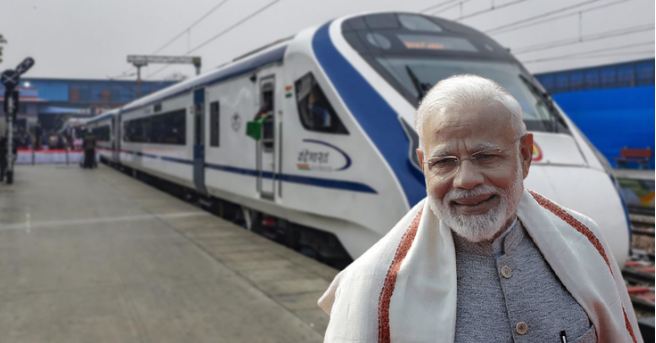By far Prime Minister Narendra Modi’s most important project, and a flagship one at that, ‘Make in India’ is transforming India and making it a business hub for global manufacturers across a variety of sectors. Manufacturers from sectors like automobiles, electronic consumer goods, pharmaceuticals, defence systems, aviation among others are just a few who have turned to India as their destination to disrupt the existing global supply chains.
The Make in India initiative is currently in its eighth year of existence, and in all these years, it has turned the country into a powerhouse of domestic manufacturing and reliance.
People laughed at ‘Make in India’. When it was launched as Prime Minister Narendra Modi’s flagship programme, many among the opposition and BJP-baiting camp ridiculed the initiative; because according to them, India does not have it in it to become a global manufacturing hub. Now, such individuals have nothing but egg on their stupid faces.
India to Manufacture 400 Indigenous Vande Bharat Trains
Finance Minister Nirmala Sitharaman on Tuesday announced that 400 new Vande Bharat trains will be introduced and the Railways will also develop new products for small farmers and MSMEs. Presenting the Union Budget, she said, “400 new-generation Vande Bharat trains with better energy efficiency and passenger riding experience will be developed and manufactured during the next three years.”
The finance minister also informed the Lok Sabha that these new trainsets are going to be made of light-weight aluminium, as opposed to steel, making each around 50 tonnes lighter in weight, consuming much less energy than their steel counterparts. The cost of each train set is around Rs 25 crore more than the current ones, which cost around Rs 106 crore per set of 16 coaches.
The Vande Bharat train is India’s own semi-high speed train set, a collection of 16 coaches, self-propelled, which does not require an engine to haul them. It is designed and manufactured by Integral Coach Factory (ICF) at Perambur, Chennai under the Indian government’s Make in India initiative. As of August 2021, the Indian Railways operated two Vande Bharat trains, one from Delhi to Varanasi and the other from Delhi to Katra. In January 2021, Indian Railways awarded the contract for the supply of propulsion and control equipment of 44 rakes to Medha Servo Drives, based in Hyderabad.
75 new Vande Bharat trains are set to begin being deployed on Indian tracks from June this year. In the next three years, close to 500 Vande Bharat trains will be running on tracks all across India – shining as a symbol of Make in India’s success.
Rahul Gandhi had Mocked ‘Make in India’
Being the entitled brat that he is, Rahul Gandhi had chosen to ridicule the Make in India initiative. Gandhi ridiculed the lion logo of Make in India as Narendra Modi’s “babbarsher”. Back then, as Vice President of the Congress party, he had said that Prime Minister Modi had “created a babbarsher’ (Asiatic Lion)” in which “clock and wheels are seen moving”.
The Modi government is committed to ensuring that ‘Make in India’ becomes its most successful flagship programme. It is for this very reason that the central government had last month cancelled multiple deals for the purchase of short-range Surface-to-Air missiles and a tender for the purchase of 14 choppers for the Indian Coast Guard. Many other deals are under review, including the purchase of six more P-8I surveillance aircraft and Klub anti-ship cruise missiles for the Navy and Russian VSHORAD (very short-range air defence) missile system for the Army.
By cancelling the imports of such weapons, the Modi government is ensuring that they are domestically produced – which will ultimately translate into a success for the ‘Make in India’ campaign.
Read more: Seven Years of Make in India – What was dubbed as laughable back then is immensely successful today
After the launch of the initiative, India gave investment commitments worth ₹16.40 lakh crore (US$230 billion) and investment inquiries worth ₹1.5 lakh crore (US$21 billion) between September 2014 to February 2016 alone. As a result, India emerged as the top destination globally in 2015 for foreign direct investment (FDI), surpassing the United States and China, with US$60.1 billion in FDI. India had attracted an FDI inflow of 27.37 billion dollars during the first four months of 2021-22, which was 62 per cent higher as compared to the corresponding period during 2020-21. FDI equity inflow also grew by 112 per cent in the first four months of FY 2021-22 compared to the same period in 2020-21.
In 2019, the World Bank ranked India 63rd among 190 countries in the ‘Ease of Doing Business’ index. This was a jump of 23 places from its rank of 100 in 2017. The business environment is increasingly being unshackled in India, and PM Modi is personally leading a wave of reforms that will modernise and open up India’s economy. Rest assured; India has no time to rest. It must constantly look to become the most-favoured destination for businesses from around the world. We have come a long way, but the journey is far from over.
